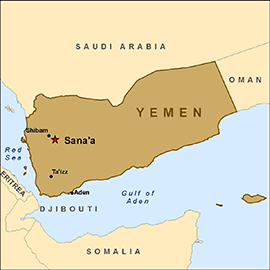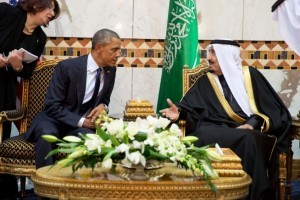The Trump administration condemns Iran as somehow responsible for a Yemeni rebel group’s attack on a Saudi warship, but ignores the Saudi-inflicted bloodbath on the Yemeni people, as Gareth Porter explained to Dennis J Bernstein.
By Dennis J Bernstein
The long-running U.S.-backed Saudi war against a Yemeni rebel group has led to mass hunger and civilian slaughter — suffering comparable to the humanitarian crisis of Aleppo in Syria though treated very differently by the U.S. establishment, according to investigative journalist and historian Gareth Porter.
I spoke with Porter, who has written extensively about U.S. policies toward Iran and is the author of Manufactured Crisis: The Untold Story of the Iran Nuclear Scare, on Jan. 31.
Dennis Bernstein: You said today — if I have this right — the U.S. media covered Russian/Syrian air-strikes in Aleppo were reported as the worst air campaign in an urban area in modern post-World War II history, highlighting the suffering of civilians, and especially, of children. Then you go on to say, “Now it has been revealed that millions of Yemenis are suffering starvation because of the almost complete disruption of Yemenis society from Saudi-lead coalition air strikes.” You say, “Children are suffering the most horrible starvation.”

King Salman of Saudi Arabia and his entourage arrive to greet President Barack Obama and First Lady Michelle Obama at King Khalid International Airport in Riyadh, Saudi Arabia, Jan. 27, 2015. (Official White House Photo by Pete Souza)
So, this needs to be a bit of a primer, Gareth. Please start by outlining the situation on the ground in Yemen. And then please explain what exactly does the United States have to do with what is being reported as a wide ranging Saudi bloodbath?
GP: Well, those are two very big questions. Each of which requires a bit of explanation. Let’s start with the situation on the ground. That is that there are millions of Yemenis in areas of the country which have been under bombardment by the Saudi led coalition.
And as a result of that bombing, which has been going on now since March of 2015, there has been a huge and very deep disruption of normal life, throughout a huge part of Yemen, the part of Yemen that was under the control of the Houthis, as well as their allies, coming from the old… the military that was associated with the previous regime–the Saleh regime–which the United States had been supporting for many years. So, this is a large part of the territory of Yemen.
And what we know is that some millions of people have been, to some extent, suffering from lack of adequate food. And particularly, of course as is usually the case, children are the ones who are suffering the most. The stories that I … sighted and tweeted yesterday [January 30], had figures that showed that 31% of children under the age of five are now suffering from acute malnutrition.
And, of course, that’s the category that includes people who are really starving to death, or close to death, as well as those people who are in the process of moving towards that condition. So those are the worst hits.
At one point, that would be–according to my estimate looking at the age distribution of Yemen–that would be about 1.7 million children under the age of five in Yemen who are either … in an advanced stage of malnutrition, or who are headed very far, and have gone very far in that direction.
And the same article used the figure of 7 million people who are in what they call “severely food insecure areas” of the country. Meaning that these are areas that have been bombed severely, and where the food production has been, virtually, brought to a halt. It’s been extremely limited, and therefore, access to food has been very limited. So, that’s an extremely serious situation.
It’s a humanitarian catastrophe, there’s no doubt about that. And, it is certainly on a scale similar to Syria, and in many ways, maybe worse than the catastrophe that has occurred…. humanitarian catastrophe that has occurred in Syria. And I say that because, as I go back and look at the coverage of starvation, malnutrition in Syria, the only place where it has been reported that there were cases of such severe malnutrition that people were starving to death, was in a town called Madaya, which was subject to being besieged by the Assad government troops. 
And now there may be other places, but there certainly has not been other widespread coverage of this kind of severe malnutrition in Syria over the last couple of years. So that is a picture of, you know, a real catastrophe which, I must say, has not been covered by the U.S. press…
DB: Okay, now let’s talk about… you say the United States is complicit in this crime. I guess you mean war crime. Explain the U.S. role, and why the U.S. is involved.
GP: Well, first of all, the complicity begins with the fact that the Saudi government, which, of course, is the primary national entity behind … carrying out this bombing campaign against the Yemeni people, approached the Obama administration before it went to war. Before it started the bombing campaign, it went to the Obama administration, told the administration what it wanted to do, and that administration said, “Okay, yes, we’ll support you.”
Now, there may have been questions about it, there may have been warnings now [from the Obama administration], you know, “try to not hit civilians,” so on and so forth. But the fact is that the United States approved that bombing campaign before it even started.
It would not have started if the United States had refused to go along with it. And the main reason is that the Saudis were incapable of carrying out a bombing campaign of that kind in Yemen without the United States providing the bombs and without the United States, potentially and more importantly, providing the refueling services for the flights of Saudi and UAE and other countries’ planes carrying out the bombing. So this is complicity which goes very deeply.
It means that the United States is really wholly responsible for the outcome because, at any time, over the past almost two years now, the United States could have said, “No, you cannot do this, we will stop refueling the planes.” And the Saudis and their Gulf allies would have been forced to end the entire campaign. So, that’s the nature, legally and morally, of U.S. culpability.
And, of course, the consequence is that the United States now is responsible for the civilian suffering, for the severe malnutrition and starvation that we’re seeing now in Yemen.
DB: Now, I notice that the Saudis didn’t make the Trump [immigration] ban list. Although there would be a lot of good reasons why they might be on it. Can you put that in context?
GP: Yeah. If there was a ban that reflected the degree of risk, relative degree of risk, let’s not call it the absolute degree, but the relative degree of risk from people trying to gain entry into the United States from the Middle East, you would certainly have to say that Saudi Arabia was the top risk because of the number of jihadists who have come from Saudi Arabia, and have gone to, of course, Syria, as well as Iraq, to participate in those jihadist campaigns.

Saudi King Salman meets with President Barack Obama at Erga Palace during a state visit to Saudi Arabia on Jan. 27, 2015. (Official White House Photo by Pete Souza)
And, of course, as you say, Saudi Arabia is not included. The fact is, of course, that that list of countries whose people are banned from coming into the United States is entirely political, yet includes Iran which is, of course, not a risk at all. There’s simply no basis for saying that there’s the slightest risk from Iran because it has not, in fact, been at war with the United States. Because it has been an ally of the United States against the jihadists in those countries where the United States faces the greatest risks… the countries from which the Unites States faces the greatest risks.
DB: But that hasn’t stopped the Trump administration from going and sort of implementing its policies particularly focused on… there are a number of Iranians now really directly impacted, right?
GP: That’s right. I mean, Iranians have been severely impacted by this. Students, of course, the largest number of graduate students in American universities from the rest of the world, as I understand it, are Iranians, at this point, certainly higher education, the higher levels of education.
And so, many, many Iranians now have been caught in trying to get back to the United States, or who needed to visit home, from American universities, and this was a very serious problem for them. But I would just add that, you know, clearly this administration is not basing its first major foreign policy decision on the situation in the Middle East, or the degree of risk. But it’s basing it on the appeal to the constituency that elected Donald Trump.
DB: Alright, and just, again, to step back a little bit, the situation on the ground in Yemen at this moment is dire. And, is there any attempt at a truce, a treaty? There’s a lot of focus on Syria.
GP: Right. There have been negotiations going on now for many months, between the Houthis on one side, and the Yemeni government that was put into power, put back into power, by the Saudis and their coalition, after the war began.
Well, after the war began, these negotiations have been stalled because the Saudi supported officials in those negotiations have essentially refused to allow the Houthis to basically hold onto their weapons, until the process is completed. I mean, they have been demanding a prior giving up of weapons before the settlement is reached, in terms of the political part of it. So, we’re still not close to, as I understand it, to actually having a peace agreement, and a durable ceasefire.
And the United States, you know, the Obama administration, was at least trying to push the Saudis to be a bit more reasonable. But, I’m sorry to say that the problem we face here is that the U.S. government, (and I’m quite sure that the Trump administration will not be very different, if at all, from the Obama administration in this regard) the permanent government, the national security government or the “permanent war government,” as I call it, of the United States is so dependent, or shall we say so cozy with the Saudis, particularly, that they have basically screwed up Syria, they have destabilized and caused a terrible humanitarian crisis in Syria, then they went and did the same thing in Yemen, by supporting the Saudis.
Why did they do it? Because the Pentagon, the CIA and the NSA all have sweetheart deals with the Saudis which are worth a great deal of money. Both sale of arms and basically selling of intelligence services to the Saudis are at the heart of this. And also, of course, there’s access to bases that… at least the base in Bahrain, the naval base in Bahrain, which the United States covets, the U.S. Navy covets. And, therefore, the Saudis control that base, and that’s another thing that the permanent war state isn’t unwilling to give up.

The Pentagon, headquarters of the U.S. Defense Department, as viewed with the Potomac River and Washington, D.C., in the background. (Defense Department photo)
DB: And this is big business in the context of the Pentagon.
GP: It is.
DB: By the way, what are the corporations… who are we talking about now… who are happy about this?
GP: Well, you’re talking about all of the major arms suppliers. The big four, the big five of aircraft, aerospace companies who have been able to sell more weapon systems to the Saudis because of the political relationship that exists between the United States and the Saudi government. Those people are obviously very concerned, and very happy about the situation. But when you talk about big business it’s not just the private companies.
What I have found, just to summarize… the conclusion that I’ve come to in my study of the permanent war state, is that what we used to think of as a state bureaucracy has morphed into a combination of state bureaucracy and private contractors. They have merged so totally that there’s no distinction anymore. The lines have been blurred. And the Pentagon and the CIA and the NSA are all now, basically, more like corporations than they are public services, or state services, to the American people.
DB: Wow. And in terms of the actual suffering and killing, and who’s responsible, have the major human rights organizations weighed in on this? Saying, “This is who did it”?
GP: Well, I’ve not seen specific reports or studies by the human rights organizations of the humanitarian consequences. These sorts of reports have come from the World Food Program and UNICEF. But human rights organizations, to their credit, or at least Amnesty [International], in particular, was very early in reporting on war crimes by the Saudis and their allies in their bombing of Yemen.
They pointed out that the kinds of targets which were hit, in such great numbers, were indicative of a deliberate campaign that accepted the idea … that the population itself would be the ones who would be targeted and that is a very powerful indictment, which goes back to the spring, as I recall, spring or summer of 2016.
DB: Alright, we’re going to have to leave it right there. But, Garth Porter, always appreciate your work as an investigative journalist, a sort of investigative historian. Really, it’s always helpful to have you on. Thanks for your response to this, appreciate it.
Dennis J Bernstein is a host of “Flashpoints” on the Pacifica radio network and the author of Special Ed: Voices from a Hidden Classroom. You can access the audio archives at www.flashpoints.net.